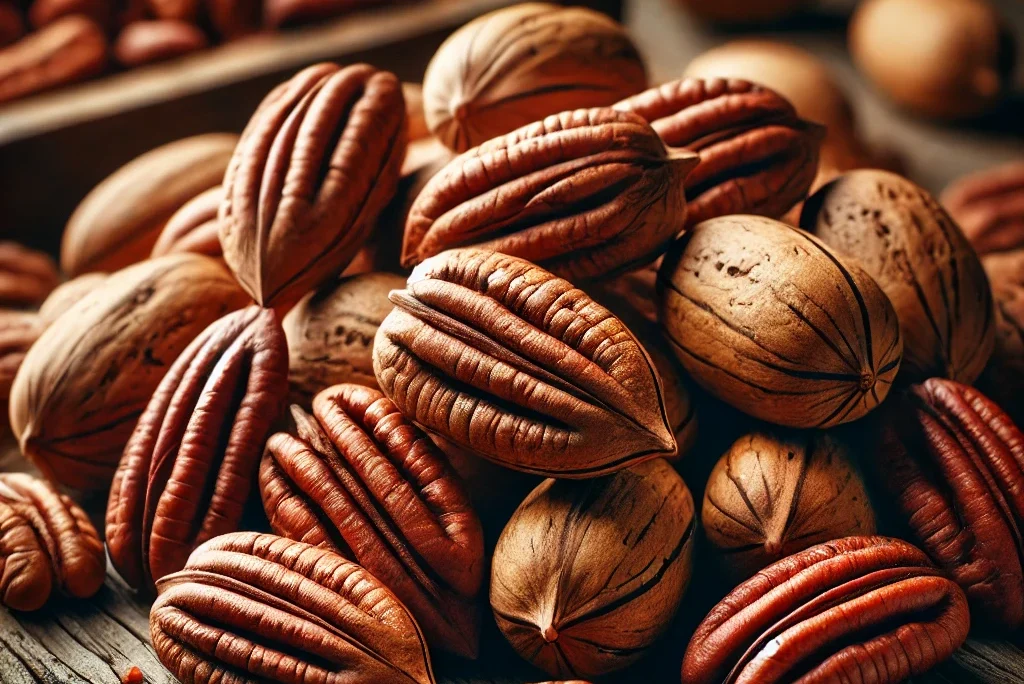Pecans are a rich, buttery nut packed with essential nutrients that offer numerous health benefits. They are an excellent source of healthy fats, fiber, and important vitamins and minerals like vitamin E, magnesium, and zinc, which support heart health, brain function, and digestion. Whether enjoyed as a crunchy snack, added to salads, or used in baked goods, pecans are a delicious and versatile way to boost your nutrition.
Nutritional Benefits of Pecans
Nutrient-Rich: Pecans are a good source of essential nutrients, including healthy fats, plant-based protein, fiber, vitamins (such as vitamin E and B vitamins), and minerals (such as magnesium, phosphorus, and zinc).
Provides Essential Minerals: Pecans are rich in key minerals such as magnesium, manganese, zinc, and phosphorus. Magnesium supports muscle and nerve function, while manganese plays a role in bone health and metabolism. Zinc and phosphorus also contribute to immune function and bone strength.
Rich in Antioxidants: Pecans are one of the most antioxidant-rich nuts, helping to fight oxidative stress and reduce the risk of chronic diseases. The high levels of vitamin E and flavonoids in pecans help protect the body from oxidative stress, reduce inflammation, and lower the risk of chronic diseases like heart disease, cancer, and diabetes. Antioxidants also promote healthy skin by reducing signs of aging.
Boosts Immune Function: Pecans are a good source of zinc and other immune-boosting minerals. Zinc helps strengthen the immune system, support wound healing, and reduce inflammation in the body.
High in Healthy Fats: Pecans are an excellent source of monounsaturated fats, which are considered heart-healthy fats. These fats help lower bad cholesterol (LDL) levels and improve cardiovascular health. Pecans also contain omega-3 fatty acids, which reduce inflammation and support brain function.
High in Fiber: Pecans are a good source of dietary fiber, which is essential for digestive health. Fiber promotes healthy digestion, helps prevent constipation, and supports a healthy gut microbiome. Fiber also aids in weight management by increasing feelings of fullness and reducing overall calorie intake.
Supports Heart Health: The combination of healthy fats, fiber, and antioxidants in pecans makes them a heart-healthy snack. Regular consumption of pecans can help reduce LDL cholesterol levels, lower blood pressure, and improve overall cardiovascular function, reducing the risk of heart disease.
Supports Brain Health: Pecans contain vitamin E and other antioxidants that support cognitive function and protect the brain from oxidative damage. Regular consumption of pecans may help improve memory, focus, and overall brain health, while also reducing the risk of age-related cognitive decline.
Improves Skin Health: The vitamin E content in pecans is beneficial for skin health. It helps protect against sun damage, reduces inflammation, and promotes a youthful appearance by reducing fine lines and wrinkles.
Helps with Blood Sugar Control: Pecans have a low glycemic index, meaning they have little impact on blood sugar levels. The healthy fats, fiber, and protein in pecans help regulate blood sugar, making them a great option for individuals with diabetes or those at risk of developing the condition.
Promotes Healthy Weight Management: Although pecans are calorie-dense, they can aid in weight management due to their high protein, fiber, and healthy fat content, which promote feelings of fullness and reduce the likelihood of overeating.
Uses of Pecans
Raw Pecans: Unroasted and unsalted pecans are the healthiest option, retaining their natural nutrients.
Roasted Pecans: Pecans can be dry-roasted or oil-roasted. Be cautious of added salt or oils, which can increase sodium and calorie content.
Pecan Oil: Extracted from pecans, this oil can be used for cooking and salad dressings.
Pecan Flour: Made from ground pecans, pecan flour can be used as a gluten-free alternative in baking.
Pecan Butter: A spread made from ground pecans, similar to almond or peanut butter.
Safety Considerations
Allergies: Pecans are a common allergen, and individuals with nut allergies should avoid them.
Caloric Density: While pecans are nutritious, they are also calorie-dense. Portion control is important, especially for those monitoring their calorie intake.
Oxalates: Pecans contain oxalates, which can contribute to kidney stone formation in susceptible individuals. Those with a history of kidney stones should consult a healthcare provider regarding pecan consumption.
Conclusion
Adding pecans to your diet is a simple and tasty way to enhance your overall health. Their heart-healthy fats, fiber, and essential nutrients make them a satisfying snack that supports digestion, brain function, and energy levels. Eaten raw, toasted, and incorporated into meals and desserts, pecans provide both flavor and essential nutrition. By making them a part of your regular diet, you can enjoy their many health benefits while indulging in their naturally rich and buttery taste.
